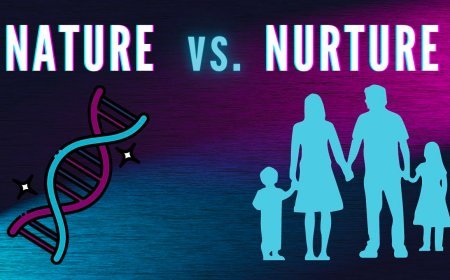The Earth Whisperer
In a world increasingly urbanized and technologically driven, there remains a profound, innate human capacity to understand and interact with the natural world. This cognitive strength is Naturalistic Intelligence, often described as being "nature smart".

The Biophilic Mind
At its core, Naturalistic Intelligence is about a deep sensitivity to and appreciation for the natural world. Individuals strong in this area are acutely aware of their surroundings, noticing subtle differences in plant species, animal behaviors, cloud formations, or the texture of soil. They have an intuitive grasp of how ecosystems function, how species interact, and the delicate balance of natural processes. This goes beyond mere enjoyment of nature; it's a cognitive ability to categorize, analyze and learn from the living world.
This intelligence manifests in various ways:
- Classification and Categorization: The ability to identify, group and organize living things and natural phenomena based on their characteristics.
- Pattern Recognition: Discerning recurring patterns in nature, such as animal migration routes, plant growth cycles or weather trends.
- Ecological Understanding: Grasping the interconnectedness of different elements within an ecosystem and the impact of human activity on the environment.
- Observation and Inquiry: A keen eye for detail in nature and a curiosity to understand how things work in the natural world.
- Survival Skills: Often (though not exclusively) includes practical knowledge for navigating and thriving in natural environments.
For those with high Naturalistic Intelligence, psyc nature isn't just a backdrop; it's a living library of information and inspiration. They often find solace and clarity in natural settings and their thinking process may involve drawing analogies from ecological systems to understand human situations. Their wordings might frequently incorporate metaphors from nature or precise terminology for species and natural processes.
Characteristics of the Nature-Smart Individual
Individuals with strong Naturalistic Intelligence often display several identifiable traits:
- A Love for the Outdoors: They genuinely enjoy spending time in nature, whether hiking, gardening, or simply observing.
- Keen Observational Skills: They notice details in their environment that others might overlook, such as a specific bird call, a unique leaf shape, or a subtle change in the weather.
- Interest in Biology and Ecology: They are often drawn to subjects like botany, zoology, geology, environmental science, or conservation.
- Ability to Classify: They naturally categorize and organize information about the natural world, whether it's different types of rocks or breeds of dogs.
- Empathy for Living Things: They often show a strong sense of care and responsibility towards animals and the environment.
- Pattern Seekers: They are adept at recognizing cycles, relationships, and cause-and-effect within natural systems.
- Practical Knowledge: They may possess practical skills related to gardening, farming, animal care, or wilderness survival. Their wordings might reflect specialized vocabulary in these areas.
- Environmental Awareness: They are often deeply concerned about environmental issues and may advocate for conservation.
Professions Where Naturalistic Intelligence Blossoms
Naturalistic Intelligence is crucial for success in numerous fields that directly engage with the natural world:
- Biologists/Zoologists/Botanists: These scientists study living organisms, their classifications, behaviors, and ecosystems.
- Ecologists/Conservationists: They focus on understanding environmental systems and protecting biodiversity and natural resources.
- Farmers/Gardeners: These roles require a deep understanding of soil, plants, climate, and pest management.
- Veterinarians/Animal Trainers: Working with animals demands an understanding of animal behavior, health, and communication.
- Geologists/Meteorologists: These professionals study earth processes and atmospheric phenomena, recognizing patterns in natural systems.
- Outdoor Educators/Park Rangers: They guide others in understanding and appreciating natural environments, often sharing their knowledge through specific wordings about flora and fauna.
- Environmental Policy Makers: Those who craft regulations to protect the environment draw on a naturalistic understanding of ecological impact.
- Landscape Architects/Designers: They design outdoor spaces that integrate human needs with natural aesthetics and ecological principles.
- Wilderness Guides/Survival Experts: These individuals use their profound knowledge of nature to navigate and thrive in challenging environments.
Cultivating the Green Thumb of the Mind
Even in increasingly urbanized societies, Naturalistic Intelligence can be consciously developed and strengthened, leading to greater connection with the world around us and a deeper sense of stewardship:
- Spend Time Outdoors: Regularly engaging with nature, whether through hiking, camping, or simply visiting a park.
- Learn About Local Flora and Fauna: Identifying trees, birds, insects, and plants in your local area.
- Gardening or Farming: Engaging directly with the growth cycles of plants provides hands-on naturalistic experience.
- Keep a Nature Journal: Documenting observations of plants, animals, weather, and other natural phenomena.
- Read Nature Books and Documentaries: Expanding knowledge about different ecosystems, species, and environmental issues.
- Visit Zoos, Botanical Gardens, Museums: Observing diverse natural elements in structured environments.
- Adopt a Pet: Learning about animal behavior and care can foster naturalistic empathy.
- Participate in Citizen Science: Contributing to scientific research by making observations in your own environment (e.g., bird counts, plant monitoring).
- Use Precise Wordings: When discussing nature, try to use accurate and specific terminology for species, processes, and phenomena to deepen understanding.
Naturalistic intelligence reminds us that humans are inextricably linked to the natural world. It's a fundamental intelligence that underpins our survival, our understanding of life, and our responsibility to protect the planet. By nurturing this connection, we not only enhance a vital cognitive strength but also foster a more harmonious relationship with the very foundation of our existence.
What's Your Reaction?
 Like
0
Like
0
 Dislike
0
Dislike
0
 Love
0
Love
0
 Funny
0
Funny
0
 Angry
0
Angry
0
 Sad
0
Sad
0
 Wow
0
Wow
0





















